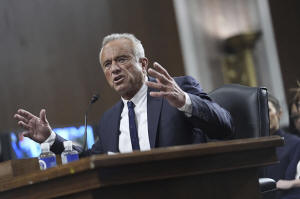Robert F. Kennedy Jr. struggles to answer questions on Medicare and
Medicaid at confirmation hearing
 Send a link to a friend
Send a link to a friend
 [January 30, 2025]
By AMANDA SEITZ [January 30, 2025]
By AMANDA SEITZ
WASHINGTON (AP) — In a contentious confirmation hearing to become the
nation's top health official, Robert F. Kennedy Jr. struggled to answer
questions about Medicare and Medicaid, programs that affect tens of
millions of Americans, or to provide details about how he would work to
drive down health care costs.
Kennedy had faced a well-funded opposition campaign from Republicans and
Democrats who highlighted his anti-vaccine rhetoric and support of
abortion access. Democrats questioned his past remarks, while
Republicans praised him for his ideas to reduce food additives and hopes
to research a rise in diseases.
As President Donald Trump's choice to be Secretary of Health and Human
Services, he ended Wednesday's three-hour hearing before the Senate
Finance Committee with strong endorsements from Republicans for him to
lead the department that accounts for $1.7 trillion in federal spending.
But Kennedy needs backing from nearly all Republicans to land the job.
And one key vote from Republican Sen. Bill Cassidy of Louisiana, a
physician who heads up the Health, Education, Labor and Pension
committee that Kennedy will sit before Thursday, appeared still
uncertain.
Kennedy had no answers for Cassidy, who asked the nominee to share plans
for Medicaid reform, a multibillion-dollar taxpayer-funded program that
covers health care for about 80 million people, including children.
Republicans have said they might need to make deep cuts to Medicaid to
fund Trump’s proposals.
After Cassidy pressed him several times, Kennedy finally replied, “I
don't have a broad proposal for dismantling the program."

He went on to misstate how the biggest programs at the agency work,
eliciting corrections from senators throughout the hearing. Medicaid, he
wrongly said, is fully paid for by the federal government — it’s not;
states and federal taxpayers fund it. Later, he talked about Medicaid's
“high premiums and high deductibles," although the virtually-free
program has neither. He appeared confused about questions on the
hundreds of community health clinics the agency funds in cities across
the country or the role it plays in a federal law that mandates
emergency rooms to stabilize anyone who presents at their facility.
And on some of the most controversial questions — like his plans for
abortion — he deferred to Trump. Kennedy, a longtime Democrat, had
previously said during his failed presidential bid that he supported
access to abortion but on Wednesday he said that every abortion is a
“tragedy.”
Views on vaccines still the biggest issue for Democrats
Kennedy tried to assure senators that he supports childhood vaccines,
pointing out that his children are vaccinated. “I believe that vaccines
play a critical role in health care,” Kennedy told the committee.
Republicans didn't ask about Kennedy's views on vaccines. Democrats,
though, repeatedly brought up previous remarks or evidence that Kennedy
has discouraged their use. The accusations often led to a terse
back-and-forth and outbursts from the audience.
Democrats also pointed to Kennedy’s writings, podcast appearances and
other comments to show that Mr. Kennedy has embraced conspiracy theories
and unproven alternative remedies, especially when it comes to the
safety and efficacy of vaccines. Sen. Michael Bennet of Colorado pressed
Kennedy over controversial and false claims he's made about COVID-19,
pesticides and AIDS. Kennedy acknowledged some of the statements and
denied others.
Bennet retorted, “This is a job where it is life and death for the kids
that I used to work with in Denver public schools and for families all
over this country that are suffering.”
Senator Bernie Sanders, an independent from Vermont who caucuses with
Democrats, said he endorsed Kennedy's slogan, “Make America Healthy
Again” but the comity stopped there. He accused Kennedy of being
hypocritical over his vaccine views. To prove his point, Sanders
displayed a photo of baby onesies that say “Unvaxxed Unafraid” selling
on the website of the Children's Health Defense, the anti-vaccine
advocacy group that Kennedy headed up until recently.
[to top of second column]
|

Robert F. Kennedy Jr., President Donald Trump's choice to be
Secretary of Health and Human Services, appears before the Senate
Finance Committee for his confirmation hearing at the Capitol in
Washington, Wednesday, Jan. 29, 2025. (AP Photo/J. Scott Applewhite)
 Kennedy said he had nothing to do
with the product, and pointed out he is no longer with the group.
Sen. Elizabeth Warren, D-Mass., repeatedly asked Kennedy if he would
agree to not collect money off lawsuits against drugmakers after
disclosing in ethics filings that he would continue to collect legal
fees from a lawsuit against Merck, over Gardasil, its human
papillomavirus vaccine that prevents cervical cancer. He made
$850,000 from the arrangement last year. If approved as health
secretary, Warren raised several changes Kennedy could make that
might enrich profits off such lawsuits, including appointing
anti-vaccine advocates to vaccine advisory panels, removing vaccines
from recommendations or changing the way the vaccine injury
compensation program works.
He would not commit to Warren's ask.
“No one should be fooled here, as Secretary of HHS Robert Kennedy
will have the power to undercut vaccines and vaccine manufacturing
across our country," Warren charged.
Sen. Tina Smith of Minnesota, meanwhile, asked Kennedy to explain
his unfounded suggestions that a dramatic increase in school
shootings in recent decades could be linked to an increase in
antidepressant use.
“These statements you’ve made linking antidepressants to school
shootings reinforce the stigma that people who experience mental
health face every single day,” said Smith, who shared she benefitted
from using the drugs as a young woman.
Republicans saw little cause for concern, much appetite for support
Some Republicans said Kennedy emerged unscathed after what they
viewed as a pile-on of attacks by Democratic senators. If Democrats
vote in a block against Kennedy, he can only lose four Republican
votes and still win confirmation.
There had been some opposition to his nomination from conservatives,
notably former Vice President Mike Pence, over Kennedy's support for
abortion rights. Under close watch was Republican Sen. James
Lankford, a Republican of Oklahoma who opposes abortion.
He and Kennedy have had “some disagreement on the issue of life,”
Lankford said, but Kennedy assured him repeatedly he would follow
Trump's lead on the issue.
Abortion was a flashpoint for Democrats, however, who zeroed in on
his plans around the abortion pill. Kennedy said Trump has asked him
to study the safety of the medication, which anti-abortion advocates
have lobbied to be further restricted. Democrats countered that the
drug has been studied for a quarter-century.

Kennedy said he wants to use the National Institutes of Health to
conduct more research on food additives, and he would work closely
with the U.S. Department of Agriculture to take a look at the
federally-funded school lunch program as well as food assistance for
the poor.
But he promised not to ban certain foods. His boss, after all, would
be unhappy if he did.
“I don’t want to take food away from anybody,” he said. “If you like
a cheeseburger — a McDonald’s cheeseburger and a diet Coke like my
boss — you should be able to get them.”
__
Associated Press writers Stephen Groves and Matthew Perrone
contributed.
All contents © copyright 2025 Associated Press. All rights reserved |